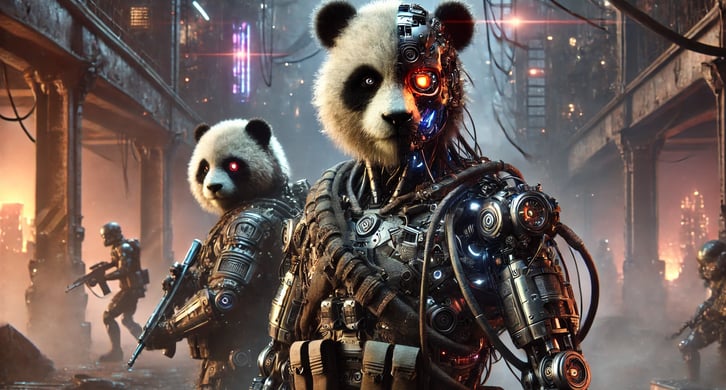Are We Already Living in a Dystopia? Exploring the Real-World Parallels of a Dystopian Future
Are we living in a dystopian society? Discover real-world parallels to famous dystopian stories like 1984, Blade Runner, and The Hunger Games, and what they reveal about our world today.
Dr.Pan
12/9/20243 min read


Ever caught yourself scrolling through the news and thinking, "This feels like something straight out of a sci-fi novel"? You're not alone. For decades, books like 1984 and films like Blade Runner have painted stark visions of the future - but as technology advances and society evolves, these once-fantastic scenarios are starting to feel uncomfortably familiar.
🚨 Stop Struggling for Cash – Let AI Build Your $10K/Month Business Starting Today.
When Fiction Meets Reality
Dystopian stories have always served as mirrors, reflecting our deepest societal fears back at us. But what exactly makes a dystopia? At its heart, it's the dark twin of utopia - a world where everything has gone sideways. Think of The Hunger Games with its brutal class divide, or 1984's all-seeing Big Brother. These aren't just entertaining stories; they're warning signs about paths we might be headed down.
The Tech Takeover
Remember when video calls seemed like pure science fiction? Now we're living in a world where AI writes poetry and robots deliver our groceries. While technological progress has brought incredible benefits, it's also introduced some distinctly dystopian elements into our lives. Social media algorithms shape our worldview, surveillance cameras track our movements, and automation threatens traditional employment. Sound familiar, Blade Runner fans?
Power, Control, and the Digital Age
When Orwell wrote about thoughtcrime and newspeak in 1984, he couldn't have imagined today's content moderation debates or social media echo chambers. Yet here we are, grappling with questions about free speech, online censorship, and who gets to control the narrative. The parallels are striking - though thankfully, we're not quite at the Ministry of Truth level yet.
⏳ Limited Time Only: See How AI Can Replace Your 9-to-5 Before This Offer Ends.
The Wealth Gap Widens
If there's one theme that runs through almost every dystopian story, it's inequality. From the districts of The Hunger Games to the corporate-dominated world of Blade Runner 2049, fiction has long warned us about the dangers of concentrated power and wealth. Looking at today's tech billionaires and growing economic disparities, these warnings feel more relevant than ever.
Modern Stories, Ancient Fears
What makes dystopian fiction so compelling isn't just the cool tech or dramatic plots - it's how these stories tap into fundamental human anxieties. Take Blade Runner 2049's exploration of artificial intelligence and human identity. As AI technology advances in our world, these philosophical questions stop being purely theoretical.
Beyond the Darkness
Here's where reality differs from fiction: we're not locked into a predetermined path. Unlike the helpless citizens of many dystopian worlds, we still have the power to shape our future. Through activism, education, and thoughtful policy-making, we can address the challenges that dystopian fiction warns us about.
Looking Forward
Are we living in a dystopia? The answer isn't a simple yes or no. While our world shows some concerning parallels to fictional dystopias - from surveillance technology to wealth inequality - we also have advantages that dystopian protagonists could only dream of. We have access to information, the ability to connect and organize, and most importantly, the power to learn from these cautionary tales.
The real question isn't whether we're living in a dystopia, but rather what we're going to do about the dystopian elements in our society. After all, the best way to avoid a dystopian future is to recognize the warning signs and take action before it's too late.
🔥 Ready to Escape the Paycheck-to-Paycheck Trap? Let AI Build Your $10K/Month Income Starting Now.
Why These Stories Matter
Dystopian fiction does more than entertain - it helps us process our fears about technology, power, and social change. When we read 1984 or watch The Hunger Games, we're not just consuming entertainment; we're engaging with crucial questions about freedom, humanity, and the kind of future we want to build.
The next time you find yourself thinking that the real world is starting to feel like a dystopian novel, remember: unlike fictional characters, we still have the power to write our own ending.
Unlock the best deals, coupon codes, and exclusive announcements from your favorite brands – all in one place. Stay informed with up-to-date stories, expert tips, and special offers tailored just for you.
✨ Why Join?
✔ Break Through Mental Blocks: Get expert tips to boost your mindset.
✔ Exclusive Deals & Discounts: Never miss a money-saving coupon or promo.
✔ Stay in the Know: Be the first to hear about new products, events, and insider updates.
📬 Sign Up Now – It’s free, easy, and your all-access pass to what matters most!
© 2024. All rights reserved.
